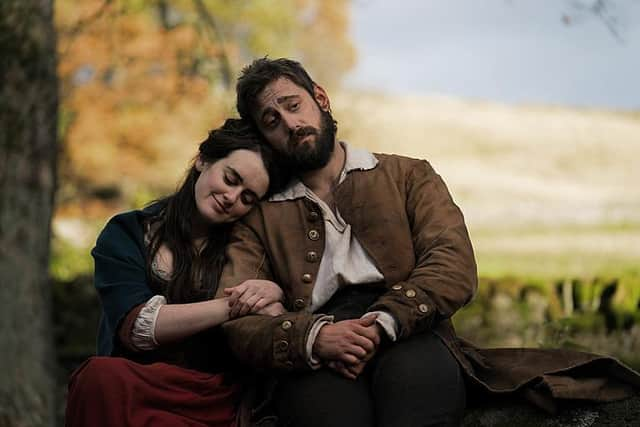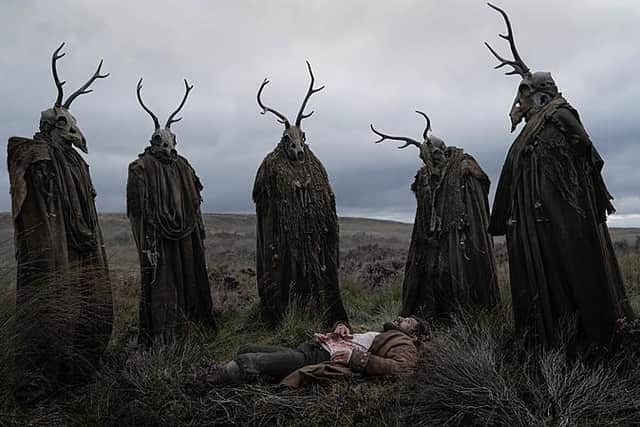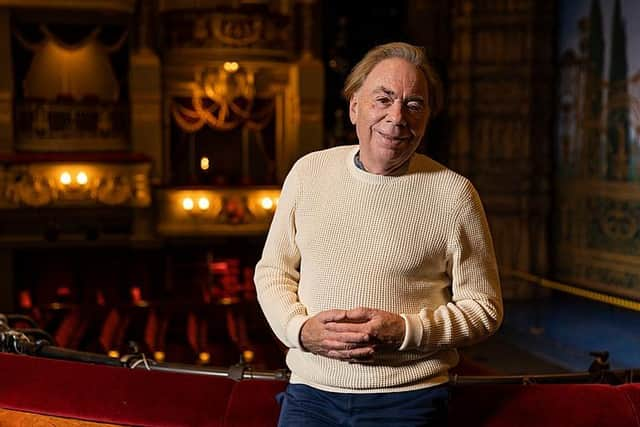The Gallows Pole review: Shane Meadows' powerfully modern period drama leaves a hung jury
and live on Freeview channel 276
It's labelled a period drama, and on the surface it has all the right ingredients – there are dirty urchins, straw-strewn pubs with bewhiskered old soaks sinking flagons of ale, corsets and jerkins.
But there are also weird men in ragged robes with antlered skulls for heads, King George III is roundly cursed in, let's say, earthy language, and there are characters called 'Mand' and 'Barb'.
Advertisement
Hide AdAdvertisement
Hide AdThe title of this first episode is called The Resurrection of Dave, and for a moment you idly wonder if there will be other characters called Steve, Terry and Darren.


Meanwhile, much of the dialogue seems improvised, and modern actors will naturally use modern language, so as well as having slightly stilted scenes where you fear the dialogue might just dry up, it is also – to ears brought up on BBC Austen and Dickens – hopelessly anachronistic.
Based on an acclaimed historical novel of the same name by Benjamin Myers, it tells the true story of the Cragg Vale Coiners, a group of cottage weavers in the Calder Valley of West Yorkshire, who supplemented their failing incomes by making counterfeit gold coins in the late 18th century.
The Dave of the episode title is David Hartley (Michael Socha), who has returned to the Vale after seven years away in Birmingham, where – judging by the cine-film flashbacks – he didn't exactly keep his nose clean.
Advertisement
Hide AdAdvertisement
Hide AdHe returns to find his friends and family suffering in the early throes of the Industrial Revolution, when mechanisation decimated cottage industry weavers and spinners, and forced thousands of people into the towns and cities of the Midlands and the north.


“When you left, the rag trade was booming,” David's brother William tells him, “but now the only work is in Halifax.
“But every month on the dot, that clothier still knocks for his rent for that thing [a spinning wheel], knowing damn right he gives that work to his mates.”
There's clearly a resonance here, given the current cost of living crisis. The idea that when life gets hard, working people suffer, and when life gets really hard you can work as much as you like and it doesn't make a difference. Meanwhile, we all know an certain elements who are insulated from it all, but still claim the moral high ground.
Advertisement
Hide AdAdvertisement
Hide AdAnd it illustrates that, when a community feels isolated, neglected, ignored, it will look after itself any way it can, regardless of the rules and conventions of the day.


And this is where those anachronisms and the hallucinogenic weirdnesses of David's wanderings lift The Gallows Pole out of the period drama corset and brings it roaring into the modern era, with an immediacy and potency that would be lost with a load of thees and thous.
In just one long scene at the wake for David's father, writer-director Shane Meadows reveals all the division, love, humour and desperation of people living on the edge.
And Meadows humanises his characters brilliantly, with a scene between David and Gracie (Downton Abbey's Sophie McShera) – the woman he left behind when he went to Birmingham – beautifully played, as their attempts to tauntingly belittle each other fail to hide genuine attraction.
“Have you got a husband?” David asks.
“No.”
“Why not?”
“What do you mean 'why not?'. Why haven't you got a wife?”
Advertisement
Hide AdAdvertisement
Hide AdIt's a difficult thing to grasp, with the committed performances and naturalistic style interrupted by the modern-day dialogue and sensibility.
But the imagery and power still lingers, playing around in the mind, and maybe that's judgement enough.
60 Days on the Estates (Channel 4, Sun, 9pm) saw explorer Ed Stafford – a man more used to the Amazon and the outback – tackling the urban jungle. It runs dangerously close to poverty tourism, but Stafford allows his interviewees space to talk, and their stories are eye-opening.
Andrew Lloyd-Webber is not everyone's favourite person, but Who Do You Think You Are? (BBC1, Thurs, 9pm) managed it's usual trick of making its subject sympathetic will digging up wonderful stories about their ancestors – including Dutch musicians and landed gentry.